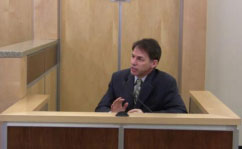Communicating Forensic Science
How jurors respond to forensic identification expert testimony presented at trial
N. J. Schweitzer, Principal Investigator
Arizona State University
Background and Purpose
 The broad purpose of this project was to contribute to the sparse knowledge that currently exists regarding how jurors respond to forensic identification expert testimony presented at trial. We pursued this goal by conducting a series of controlled studies involving jury simulations or mock trials. Jury simulations are experimental studies in which the researcher attempts to construct a setting that mirrors, in fundamental ways, a jury decision-making environment. Jury simulations vary widely in terms of participants, materials, physical settings, realism, methods, independent variables, dependent measures, and other experimental features. As we describe later, we produced a series of mini-trials for our studies, and went to great lengths to incorporate a variety of realistic features into those trials and subsequent mock juror deliberations.
The broad purpose of this project was to contribute to the sparse knowledge that currently exists regarding how jurors respond to forensic identification expert testimony presented at trial. We pursued this goal by conducting a series of controlled studies involving jury simulations or mock trials. Jury simulations are experimental studies in which the researcher attempts to construct a setting that mirrors, in fundamental ways, a jury decision-making environment. Jury simulations vary widely in terms of participants, materials, physical settings, realism, methods, independent variables, dependent measures, and other experimental features. As we describe later, we produced a series of mini-trials for our studies, and went to great lengths to incorporate a variety of realistic features into those trials and subsequent mock juror deliberations.
The law expects witnesses to present, accurately and completely, relevant information of which they have personal or expert knowledge. Jurors, in turn, are expected to understand the testimony and to assign it appropriate weight in deliberations when they integrate it with other relevant evidence. But what factors affect how a juror will understand and weigh complex forensic identification expert testimony? For example, will jurors assume that experienced experts are more trustworthy (or less trustworthy) than less experienced ones? Will they assume that forensic results that are the product of highly sophisticated technology are more probative than equivalent results that emerge from less sophisticated technology? Will they assume that forensic methods that have been scientifically tested are more reliable than those that have not been tested? We suspected that matters might become more complicated when forensic methods have some potentially desirable properties (e.g., high technology methods that have been scientifically tested) but not others (e.g., expert is not experienced). Under these conditions, how will jurors weigh the forensic evidence that they hear?
We also set out to examine whether the forensic expert’s expressed level of subjective certainty and his/her degree of willingness to concede the possibility of error could impact jurors’ views of the strength of the forensic evidence. Consider subjective confidence levels. On the one hand, and for obvious reasons, extreme levels of professed certainty (e.g., “I’m 100% certain”) might bolster a factfinder’s confidence in the forensic result. But if such certainty seems unwarranted or comes across as hyperbole or bias, jurors might treat those forensic results as less reliable than they otherwise would.
Finally, we considered the issue of exculpatory evidence offered by the defense. Defendants sometimes vigorously challenge damaging forensic evidence either by drawing attention to weaknesses in the forensic evidence or by pointing to other forensic evidence that is favorable to the defendant’s case. Little is known about how jurors respond to such concessions or counter-evidence when it is elicited from prosecution experts.
In sum, we conducted a series of experimental studies to gain insight into the effects of a variety of real world factors on how jurors think about and use expert forensic identification evidence.

